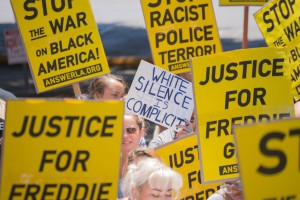Turn Up, Shut Up, and Keep Up: How to Be an Ally

If you’ve done any work in social justice circles you will have heard the word “ally”: white people are called on to be allies to people of color, straight people allies to LGBTQ people, men allies to women, and so forth. But what does it mean to be an ally, and how can one do it well? Allyship is a complex and difficult thing (and, increasingly, is not even the preferred term among activists, who now speak of being an “accomplice” rather than an ally, however for the purposes of this piece I’ll use ally). The start of being a useful ally means, to me, listening first to the people who experience the oppression you do not, because they will almost always know best how to fight it. (I say almost, because oppression can itself prevent people from seeing routes to their own freedom. I know this as a gay guy who was closeted for a long time and needed straight allies to be able to come out. But in the vast majority of cases, I will take the lead of those who suffer the oppression we are fighting.)
I’ve come to think of this process of listening as having three components: turn up (be present when requested, and not when requested to stay away); shut up (follow the lead of people of color, and be willing to do what they ask of me); and keep up (maintain engagement with the issue beyond the point when I feel like I can drop it because it doesn’t affect me).
What does this mean in practice? If, for instance, I’m allying with people of color to fight for racial justice in the criminal justice system, first I will try to show up: I find events, groups, and organizations in my area working for the emancipation of people of color, and see if they are willing to let me attend. I attend rallies and protests on issues affecting the black community. I try to get out of my comfort zone and be visible, as a representative of my organization and as an individual, in spaces that are majority black. I try to show up.
Second, shut up. I try to remember that this work is not about white people like me, and it is not primarily about atheism or homophobia or other issues which directly affect me. If you’re a white guy like me, you shouldn’t seek to be a leader or spokesperson on issues affecting people of color (unless, for some reason, you are asked). I take a back seat, learn from black leaders, and listen to what they want me to do. That’s very difficult for many white people to do—it’s difficult for me because I like to be the center of attention!—but if you want to work alongside others for freedom you have to know when to follow. So, I follow the leadership of people of color and I listen to what they tell me. For atheists, this will mean sometimes working with and taking direction from religious leaders. That’s ok—I try to remember this is not about us. I’ve become comfortable working in religious coalitions to achieve broader goals.
Third, keep up. There’s a tendency for outside groups to swoop in for a photo shoot at a rally and then never be seen again. There’s some of this in the atheist movement’s approach to LGBTQ issues—we table at Pride but do nothing at all the rest of the year. I don’t want to do that, because I don’t think that’s being a great ally—I try to keep up my commitment to the struggle, and work for long-term change.
All of this is difficult to do, and to work as an ally like this simultaneously on racial injustice, gender injustice, and all other forms of injustice would require more time and effort than any one individual has to offer. Even the most dedicated activist for justice cannot be everywhere at once. So the last thing I try to remember is to treat others and myself with grace and forbearance. Nobody is perfect, so I try not to expect perfection from myself or others. Sometimes I can get very angry and upset if certain people aren’t at the gay rights events and marches and protests I feel so passionately about, and I feel tempted to question their dedication to the cause—but then I remember that I myself, despite having a job which gives me lots of time for activism, cannot possibly be at all the events I’m asked to attend, and doubtless others are questioning my commitment too. Recognizing our common limitations is, I think, important for building the positive, long-term relationships that sustain movements for change.
These principles of allyship—turn up, shut up, and keep up—are perfectly aligned with humanist values. As humanists, we understand that our own knowledge is limited by our social position and personal circumstances, and that knowledge creation is a shared enterprise that often requires individuals to defer to others with greater understanding. We recognize, too, that any movement toward justice will require the collective effort of people from across society—privileged and oppressed. Finally, humanists appreciate history, and that leads us to the conclusion that it is never most effective for one group to act as “savior” for another. It’s best to follow the lead of those most affected by a problem, and that means showing up, shutting up, and keeping up!
